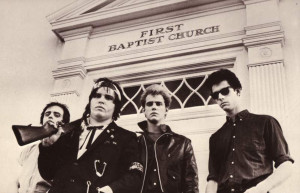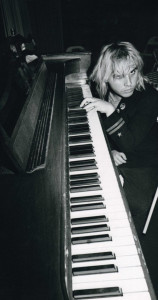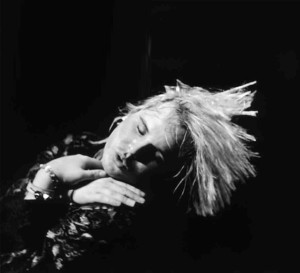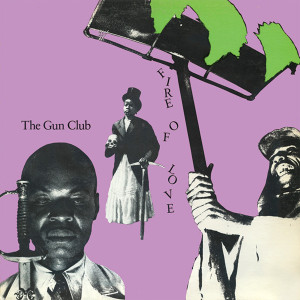(SUPERIOR VIADUCT/RHINO ENTERTAINMENT/SLASH RECORDS/RUBY RECORDS; reissue, 2014; original release, 1981)
When Chris D (Desjardins) started Ruby Records (ostensibly to release his own Flesh Eaters music, though the label eventually released influential albums by the Dream Syndicate, Lydia Lunch and the Misfits), the second release was FIRE OF LOVE by the Gun Club. The album has become the standard-bearer of the LA punk scene’s rockabilly revivalists (even outstripping the mighty X as the best example of the genre). It is one of those albums that has very rarely (if ever) gone out of print; now the amazing Superior Viaduct label has reissued the original eleven-track record (re-mastered) on vinyl and CD. If you’ve missed out on FIRE OF LOVE over the past 33 years (or, if like me, you were bone-headed enough to dismiss it out of hand when it was originally released), you’ve been given a reprieve from the divine beings (or, maybe, demonic beings would be more apt) of rock and roll. So… why should you care now? As wildly erratic as Jeffrey Lee Pierce was during his troubled life, the song cycle (playing out like a concept album or a bizarre operetta) on this first Gun Club album stand as one of the greatest (and most cohesive) collections of Los Angeles roots punk… ever.

Album opener, “Sex Beat,” is everything that rock and roll should be: Liberal doses of sex and drugs with just the right amount of Carl Perkins style hillbilly music, Johnnie Johnson (the REAL king of rock ‘n’ roll) rhythm and blues, Jonathan Richman-like vocal peculiarities and Robert Johnson haunted hoodoo honk. The band’s cover of Son House’s “Preaching the Blues” (itself a variation on Johnson’s “Preachin’ Blues”) adds a sense of urgency via Pierce’s manic howls and Ward Dotson’s slide guitar work. If there could ever be anything like a balls-out ballad, “Promise Me” is it. It features a heavy bottom end, provided by the Bags’ Terry Graham and Rob Ritter and an eerie, haunting vibe, courtesy – once more – of Ward’s slide. “She’s Like Heroin To Me” comes off like a ragged marriage of early Pretty Things nastiness and Elvis Presley’s nascent rhythm and blues sides. Pierce’s voice is thin, almost delicate, on the track adding a vulnerability that’s far too real for comfortable listening. Percolating and throbbing, “For the Love of Ivy” is Jeffrey Lee’s take on the Johnny Cash murder song (with a weird BONANZA theme song rhythm). He yelps and howls through such telling lyrics as, “I’m gonna buy me a graveyard of my own/And shoot everyone who ever done me wrong/I’m gonna buy me a gun just as long as my arm/And shoot everyone who ever done me harm.” The tattered vocals and dirty, repetitive guitar riff make “Fire Spirit” a highlight, though there are many who would tag it as either a weak demo or a throwaway track added to pad the album. Listen again and dig a bit deeper… you’ll see why it’s a true high mark on a decidedly brilliant record.

Side two opens with “Ghost On the Highway,” crashing the Johnny Cash versions of Stan jones’ “(Ghost) Riders In the Sky” and Ervin T Rouse’s “Orange Blossom Special” into a frantic rockabilly stomp. “Jack On Fire” seems to be the most fully-realized song on the album, with its memorable, stinging guitar lead from Dotson, bouncy rhythm and Pierce’s vocals, for once, not seeming to be completely at odds with the music. It isn’t that the vocals are unlistenable (or even bad, at all), it’s just that Jeffrey Lee’s voice sometimes has a disconnected feeling, which makes for a more adventurous listen. Terry Graham’s martial, chugging drumming highlights “Black Train,” another murder song about a man trying to escape the law and his past. The black train has long been associated with death and Pierce’s howls play into that scenario; the question is, however, is the train taking him to Hell for his crime or is he trapped with the spirit of his victim? As the tune melds into “Cool Drink of Water,” we may have our answer. Sounding like a hillbilly dirge, with a plaintive slide guitar snaking over the top, the odd yodeling style of Jeffrey’s virtually incoherent vocals deliver such ominous lines as, “I ask for water and she gave me gasoline” and “I asked the conductor, could I ride the blinds?/Son, buy your ticket, for that train ain’t none of mine.” The thing is a masterpiece of creepiness. “Goodbye Johnny” sounds like Jonathan Richman fronting the Blasters. Lyrically, it is the final chapter in a tale of infidelity, violence, murder, revenge and ultimate retribution, tying together all of the thematic threads woven throughout the previous ten tracks.

The cohesiveness mentioned above is made more remarkable by the fact that two different producers worked on the album: Chris D himself (producing the first two and the final track on side one, as well as the first two tracks of side two) and Tito Larriva (the remaining six songs). The five tracks produced by Desjardins generally have a fuller sound, but the entire album bristles with an unbridled passion and a creepy horror vibe that’s just too impressive to pass up… again!

